Dirt Contractors Denver
Find top Dirt Contractor in Denver
Receive up to 3 Dirt Removal quotes for your project today! Compare profiles, reviews, accreditations, portfolio, etc... and choose the best offer.
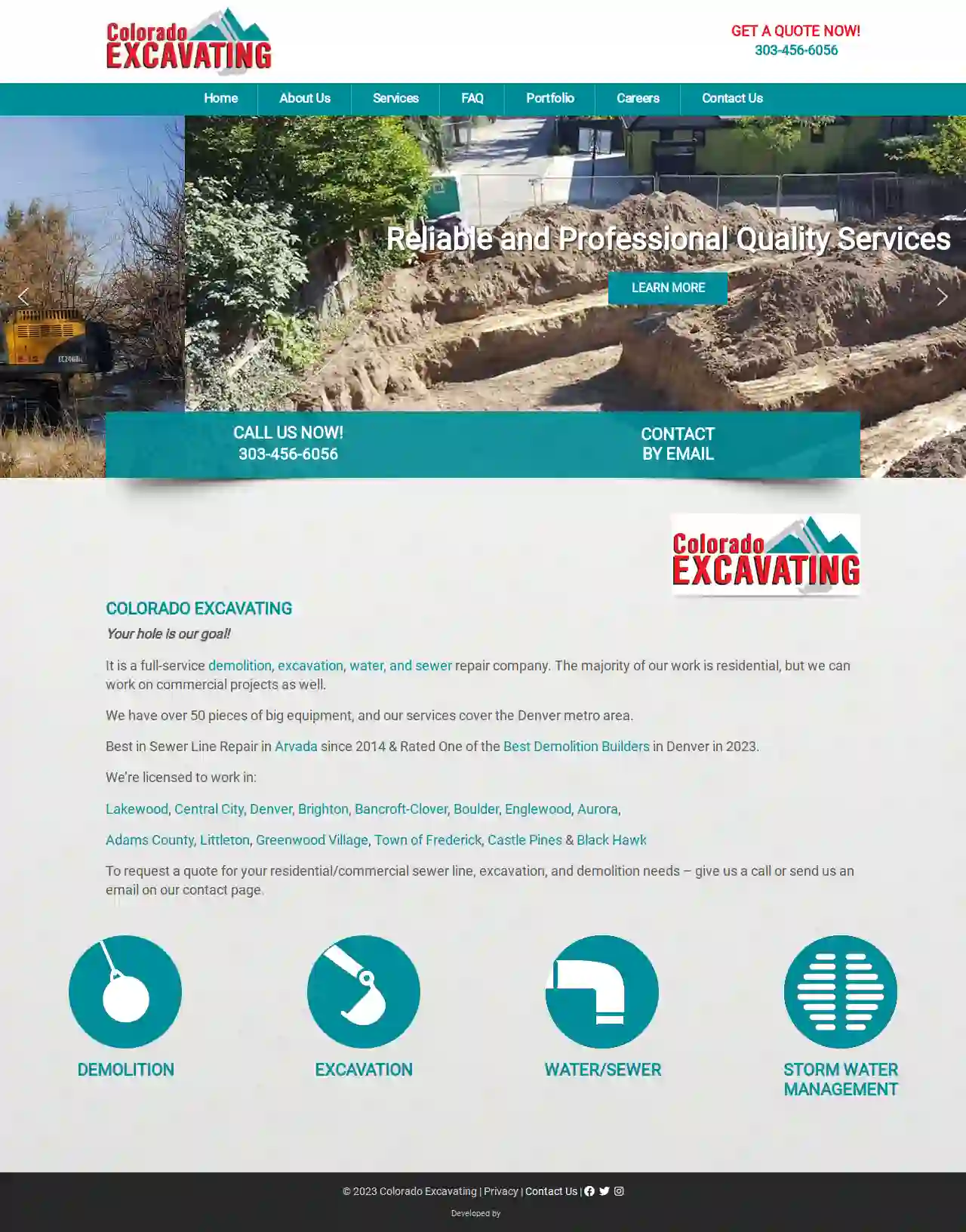
Colorado Excavating
4.332 reviewsDenver, USColorado Excavating: Your Hole is Our Goal! Colorado Excavating is a full-service demolition, excavation, water, and sewer repair company. We primarily serve residential clients, but we also handle commercial projects. With over 50 pieces of heavy equipment, we provide services throughout the Denver metro area. We've earned a reputation for excellence, being recognized as one of the best demolition builders in Denver in 2023 and the top choice for sewer line repair in Arvada since 2014. Our licensed service areas include: Lakewood Central City Denver Brighton Bancroft-Clover Boulder Englewood Aurora Adams County Littleton Greenwood Village Town of Frederick Castle Pines Black Hawk For all your residential and commercial sewer line, excavation, and demolition needs, contact us for a free quote. You can reach us by phone or email through our contact page.
- Services
- Why Us?
- Gallery
Get Quote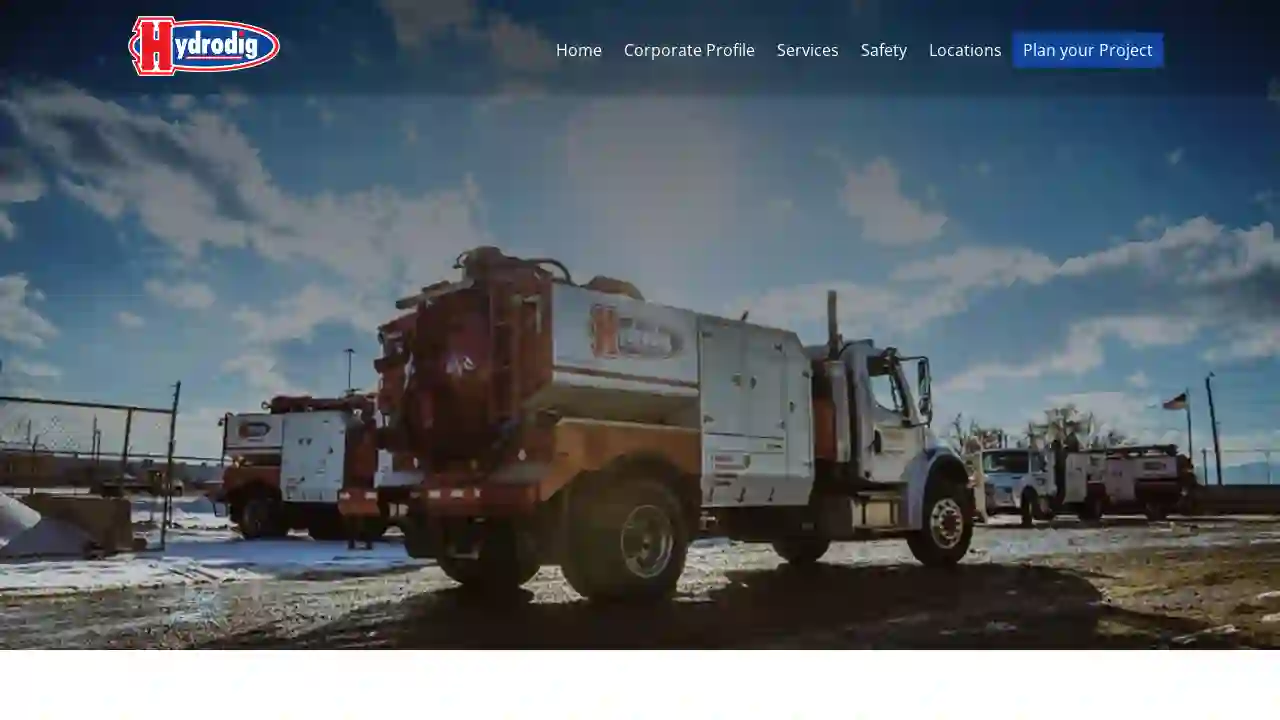
Hydrodig of Denver
4.418 reviews4410 50 St., Bentley, T0C 0J0, USWho is Hydrodig? Incorporated in 1997 and commencing hydro-excavating activities in the spring of 1998, Hydrodig™ has become one of North America’s leading hydrovac companies with Canadian service locations in British Columbia, Alberta, Saskatchewan and Ontario as well as with USA locations in Denver, CO and Dallas, TX. Hydrodig™ undertook initial Western Canada expansion in 2000 with the creation of an owner / operator network of hydrovac service providers. In 2009, Hydrodig™ created its first international entity, Hydrodig™ USA LLC. With locations from Vancouver BC to Ottawa ON and the exposure in the USA, Hydrodig™ can provide safe, efficient, and cost effective solutions to any excavation project with our unique single axle, 4×4 hydro-excavating units. What Is Hydro-Excavation? Numerous terms are associated with this activity: potholing, daylighting, hydro-trenching, hydrovacing and non-destructive excavating to name a few. What is Hydro-Excavation? Simply put, hydro-excavation is the process of utilizing high-pressure water and a powerful vacuum system to excavate. A high pressure water stream loosens the earth and other debris while simultaneously removing and storing the slurry within the onboard vacuum system. This precision orientated activity is predominately used to expose underground infrastructure while determining/proving its precise location OR its non-existence within a proposed excavation area. What is Hydro-Excavation? All in a safe, non-destructive fashion. Examples of underground infrastructure include oil and gas pipelines, water pipelines, sewer pipelines, fiber optic cables, electrical cables, and other utilities.
- Services
- Why Us?
- Gallery
Get Quote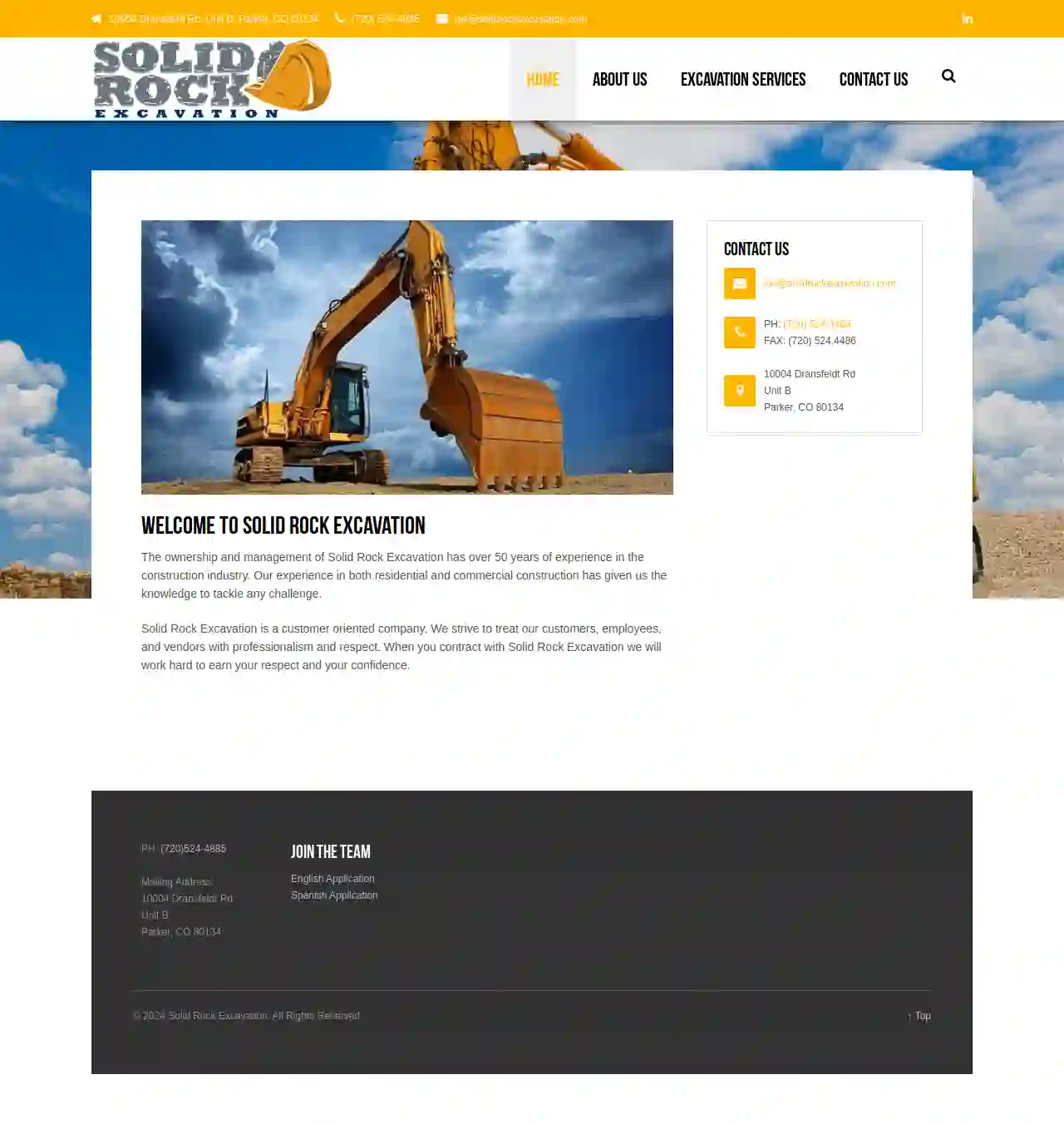
Solid Rock Excavation
54 reviews10004 Dransfeldt Rd, Unit B, Parker, 80134, USSolid Rock Excavation: Building on a Foundation of Experience and Integrity Solid Rock Excavation is a customer-oriented company with a rich history in the construction industry. Founded by Joe Chupp, who boasts over 50 years of experience in both residential and commercial construction, Solid Rock brings a wealth of knowledge and expertise to every project. Joe's dedication to quality, integrity, and honesty is reflected in every aspect of the company's operations. At Solid Rock, we believe in building strong relationships with our customers, employees, and vendors. We strive to treat everyone with professionalism and respect, earning your trust and confidence with every interaction. Our commitment to safety and a positive work environment ensures that our team is well-equipped to handle any challenge. Joe's journey with Solid Rock began in 2009, where he held various roles, including operator, Project Manager, and VP of Operations. His dedication and leadership led him to become the owner of Solid Rock Excavation in 2020. This deep understanding of the industry, coupled with his commitment to excellence, makes Solid Rock Excavation the ideal partner for your construction needs.
- Services
- Why Us?
- Our Team
- Gallery
Get Quote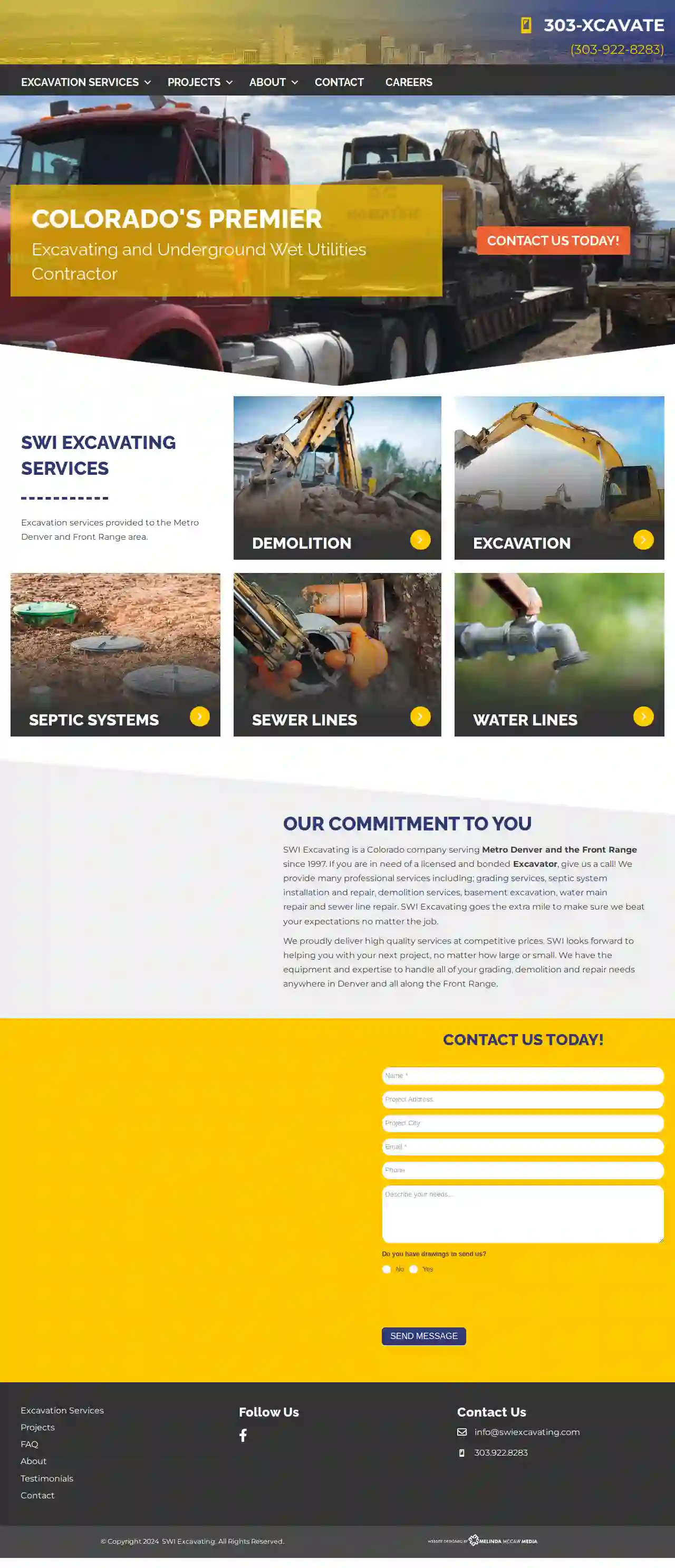
SWI Excavating
4.724 reviewsDenver, US- Services
- Why Us?
Get Quote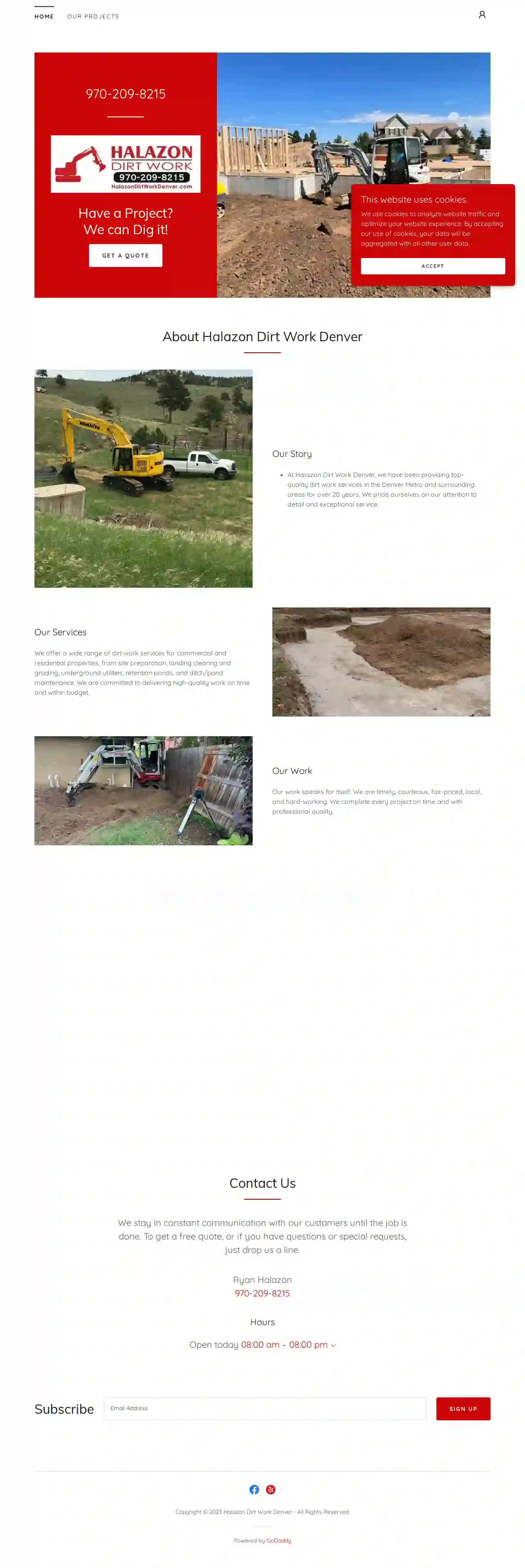
Halazon Dirt Work Denver
53 reviewsDenver, US- Services
- Why Us?
Get Quote
Over 3,943+ Excavation Companies in our network
Our excavation contractors operate in Denver & surrounding areas!
ExcavationHQ has curated and vetted the Best Excavation Contractors near Denver. Find a trustworthy pro today.
Frequently Asked Questions About Dirt Contractors
- Erosion Control: Implement measures to prevent soil erosion during and after excavation, grading, or dirt removal. This includes using silt fences, erosion control blankets, or planting vegetation to stabilize the soil.
- Soil Conservation: Preserve existing topsoil whenever possible, as it's a valuable resource for plant growth. Strip and stockpile topsoil separately for reuse in landscaping or gardening.
- Responsible Waste Management: Dispose of excess dirt, debris, and contaminated soil responsibly at designated facilities. Recycle materials whenever possible to reduce waste sent to landfills.
- Dust Control: Minimize dust generation during excavation and hauling by using water sprays, misting systems, or other dust suppression techniques.
- Noise Reduction: Use noise-reducing equipment and schedule noisy activities during permitted hours to minimize disturbance to neighbors and wildlife.
- **Good Drainage:** Allows excess water to drain away, preventing waterlogging and root rot.
- **Adequate Aeration:** Provides sufficient air pockets for root respiration.
- **Nutrient Retention:** Holds onto essential nutrients for plant uptake.
- **Easy to Work With:** Not too heavy or too light, making it manageable for digging and planting.
- Clean Fill: Consists of uncontaminated soil, rock, or gravel, free from organic matter, debris, or hazardous substances. Suitable for most construction and landscaping projects.
- Structural Fill: A compacted granular fill, typically gravel, crushed stone, or a mixture of both, used for structural support and drainage. Ideal for foundations, roadways, and retaining walls.
- Engineered Fill: A specifically designed and blended soil mix with controlled properties, such as compaction, drainage, or bearing capacity, tailored for particular applications.
- Unsuitable Fill: Materials like topsoil, organic matter, or contaminated soil that are not suitable for structural fill due to their potential for decomposition, settlement, or environmental concerns.
- Environmental Site Assessment: Hire a qualified environmental consultant to conduct a Phase I Environmental Site Assessment (ESA). This involves reviewing historical records, conducting site reconnaissance, and interviewing relevant parties to identify potential environmental concerns.
- Soil Sampling and Testing: If the ESA indicates potential contamination, soil samples will be collected and analyzed in a laboratory for the presence of specific contaminants, such as heavy metals, pesticides, or petroleum products.
What are the environmental considerations for dirt contracting?
What is the best type of dirt for my garden?
What are the different types of fill dirt?
How do I know if the dirt I need is contaminated?
What are the environmental considerations for dirt contracting?
- Erosion Control: Implement measures to prevent soil erosion during and after excavation, grading, or dirt removal. This includes using silt fences, erosion control blankets, or planting vegetation to stabilize the soil.
- Soil Conservation: Preserve existing topsoil whenever possible, as it's a valuable resource for plant growth. Strip and stockpile topsoil separately for reuse in landscaping or gardening.
- Responsible Waste Management: Dispose of excess dirt, debris, and contaminated soil responsibly at designated facilities. Recycle materials whenever possible to reduce waste sent to landfills.
- Dust Control: Minimize dust generation during excavation and hauling by using water sprays, misting systems, or other dust suppression techniques.
- Noise Reduction: Use noise-reducing equipment and schedule noisy activities during permitted hours to minimize disturbance to neighbors and wildlife.
What is the best type of dirt for my garden?
- **Good Drainage:** Allows excess water to drain away, preventing waterlogging and root rot.
- **Adequate Aeration:** Provides sufficient air pockets for root respiration.
- **Nutrient Retention:** Holds onto essential nutrients for plant uptake.
- **Easy to Work With:** Not too heavy or too light, making it manageable for digging and planting.
What are the different types of fill dirt?
- Clean Fill: Consists of uncontaminated soil, rock, or gravel, free from organic matter, debris, or hazardous substances. Suitable for most construction and landscaping projects.
- Structural Fill: A compacted granular fill, typically gravel, crushed stone, or a mixture of both, used for structural support and drainage. Ideal for foundations, roadways, and retaining walls.
- Engineered Fill: A specifically designed and blended soil mix with controlled properties, such as compaction, drainage, or bearing capacity, tailored for particular applications.
- Unsuitable Fill: Materials like topsoil, organic matter, or contaminated soil that are not suitable for structural fill due to their potential for decomposition, settlement, or environmental concerns.
How do I know if the dirt I need is contaminated?
- Environmental Site Assessment: Hire a qualified environmental consultant to conduct a Phase I Environmental Site Assessment (ESA). This involves reviewing historical records, conducting site reconnaissance, and interviewing relevant parties to identify potential environmental concerns.
- Soil Sampling and Testing: If the ESA indicates potential contamination, soil samples will be collected and analyzed in a laboratory for the presence of specific contaminants, such as heavy metals, pesticides, or petroleum products.